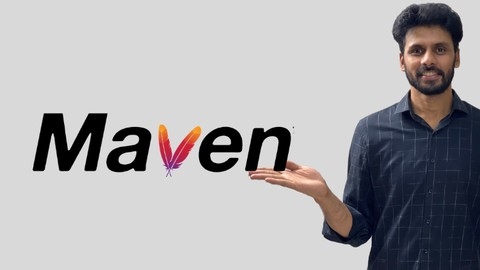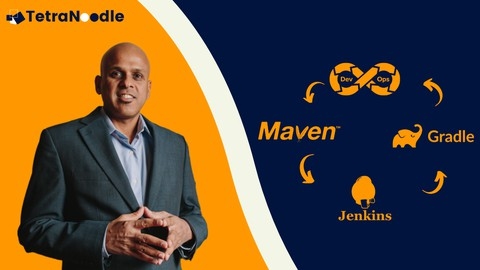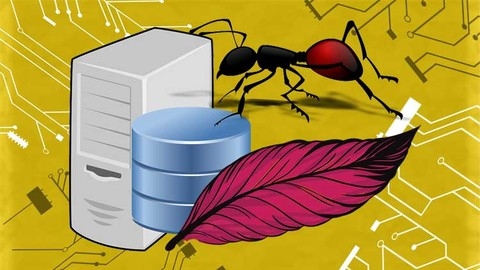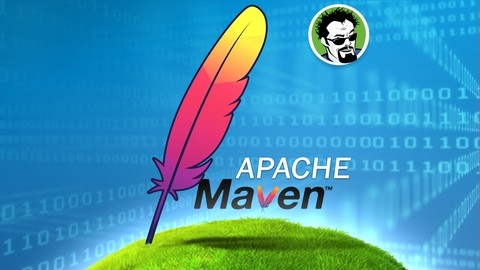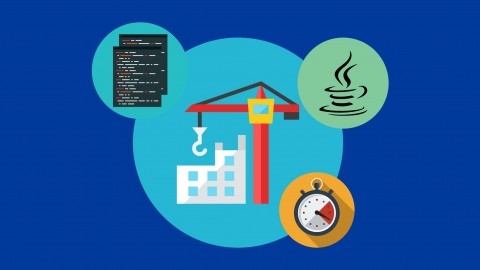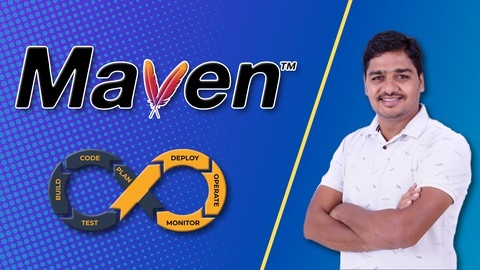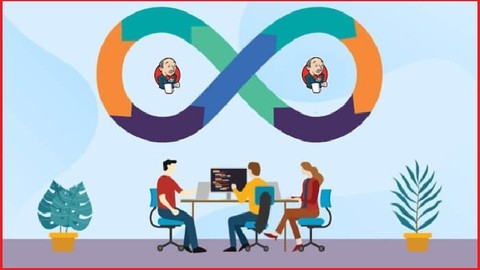Apache Maven is a powerful build automation tool used to manage Java projects, simplifying the development process.
With Maven, you can automate tasks like compiling, testing, packaging, and deploying your applications.
It streamlines dependency management, ensuring your project has the correct libraries, and helps enforce consistent project structure across teams.
Mastering Maven is a valuable skill for any Java developer, allowing you to create robust and efficient applications.
Finding a high-quality Maven course on Udemy that truly delivers can be a daunting task.
With so many options, it’s hard to choose the right one for your needs.
You’re looking for a course that goes beyond the basics and covers real-world applications, hands-on projects, and practical skills to solidify your understanding.
We’ve reviewed numerous Udemy courses and have identified Maven Crash Course: Step-by-Step Introduction for Beginners as the best overall course.
This course stands out for its comprehensive approach, covering everything from Maven fundamentals to advanced concepts like dependency management, lifecycle phases, and plugin development.
The instructor provides clear explanations, step-by-step instructions, and hands-on exercises to reinforce learning.
While this is our top pick, there are other great options available on Udemy.
Keep reading to explore our recommendations for different learning styles and goals, from beginner-friendly introductions to advanced courses focused on specific Maven use cases.
Maven Crash Course
This Maven Crash Course offers a comprehensive approach to learning how to build and manage Java projects effectively.
You’ll start by mastering the fundamentals of Maven, understanding its purpose and how it streamlines the development process.
The course guides you through setting up your environment, from installing Java, Eclipse, and Tomcat to creating Maven projects from scratch.
You’ll delve into essential concepts like POM XML, dependency management, plugins, and lifecycle phases, gaining a solid foundation for efficient Java development.
You’ll then learn how to harness Maven within Eclipse, creating web applications and multi-module projects.
You’ll become comfortable with dependency scopes, manage dependencies and plugins with ease, and explore the power of profiles for tailored project configurations.
You’ll also gain insights into code coverage using JaCoCo and Sonar, ensuring the quality of your projects.
The course goes beyond traditional Maven skills, introducing you to modern technologies like Spring Boot and Jenkins.
You’ll gain a practical understanding of how to build efficient, scalable web applications and implement Continuous Integration and Continuous Delivery (CI/CD) pipelines.
You’ll even explore Docker, a containerization technology that simplifies deployment and management.
Finally, you’ll unlock the potential of Maven by creating your own plugins.
You’ll learn how to implement Mojo, write tests, and integrate your plugins into other projects.
You’ll also gain a thorough understanding of properties, enabling you to customize Maven configurations for specific needs.
This course provides a well-structured path to mastering Maven, from the basics to advanced concepts.
It equips you with the skills necessary to build and manage robust Java projects, making it a valuable resource for any developer seeking to improve their efficiency and productivity.
DevOps: CI/CD with Jenkins pipelines, Maven, Gradle
This course covers a comprehensive journey through Continuous Integration (CI) and Continuous Delivery (CD) using Jenkins, Maven, and Gradle.
You’ll start with an introduction to Jenkins, its features, architecture, and how it fits into the Software Development Life Cycle (SDLC) and DevOps culture.
After installing and configuring Jenkins, you’ll dive into building CI/CD pipelines using popular tools like Gradle and Maven for Java web applications.
A key part of the course focuses on integrating Artifactory, a binary repository manager, into the CI/CD pipeline.
This allows you to manage and deploy your application artifacts efficiently.
Going beyond applications, you’ll also learn how to manage database schema changes using Jenkins and the Sqitch tool.
This is crucial for maintaining data integrity during application deployments.
The course doesn’t stop there - it covers operational aspects like securing Jenkins, scaling it for larger teams, and various tips and tricks to get the most out of Jenkins.
Throughout the syllabus, you’ll find quizzes to test your knowledge after each major section.
Learn Maven and Ant the easy way!
This comprehensive course will equip you with the essential skills to confidently manage the build process for your Java projects using two powerful and widely-adopted build tools: Apache ANT and Maven.
You’ll start with a solid foundation in ANT, learning to set up your environment, create basic “Hello World” programs, and define tasks using its XML-based syntax.
You’ll gain hands-on experience working with properties, paths, and types, and you’ll discover how to automate the build process for your projects.
The course also explores using ANT alongside Eclipse, a popular IDE, and guides you through creating custom tasks to extend ANT’s capabilities.
Once you’ve mastered the fundamentals of ANT, you’ll delve into Maven, a more sophisticated and versatile build tool.
You’ll explore key concepts like the Project Object Model (POM), dependencies, repositories, and lifecycles.
The course will guide you through creating Maven projects, managing dependencies, and understanding different repository types.
You’ll also learn to leverage Maven’s powerful features like dependency scopes, transitive dependencies, and exclusions, allowing you to fine-tune how your project’s dependencies are managed.
The course moves on to explain Maven’s lifecycles, phases, goals, and plugins, enabling you to automate complex tasks like compiling, testing, packaging, and deploying your applications.
You’ll discover how to create your own custom Maven plugins, further expanding its functionality.
You’ll learn to create Maven profiles, customizing your build process for different environments.
You’ll be equipped to confidently tackle the intricacies of the build process, paving the way for smoother development cycles and higher-quality projects.
Apache Maven: Beginner to Guru
This comprehensive course guides you through the intricacies of Apache Maven, from its fundamentals to advanced applications.
You’ll start with the basics, learning to install and configure Maven on your system and delving into core concepts like Maven coordinates, repositories, and the project object model.
The course also covers essential Maven plugins, such as the Clean Plugin, Compiler Plugin, and Surefire Plugin.
You’ll then explore how to harness Maven for testing, including unit testing with JUnit, integration testing with Maven Failsafe, and generating reports with Jacoco.
You’ll also discover how to use Maven to generate source code from XSD and JSON schemas.
The course even dives into working with alternate JVM languages like Groovy, Kotlin, and Scala, providing practical experience with these popular technologies.
The syllabus includes a section dedicated to multi-module projects, teaching you how to build complex applications using Maven.
You’ll also learn about Maven build profiles, a powerful tool for managing configurations across different environments.
The course ventures into the world of Spring Boot, demonstrating how to create Spring Boot projects with Maven and deploy them to popular repositories like Packagecloud and Nexus.
You’ll gain a thorough understanding of Maven release management, enabling you to automate your release processes.
Moving beyond the theoretical, the course delves into real-world scenarios, addressing common challenges like dependency conflicts, developing with snapshot versions, and deploying to Maven Central.
You’ll learn about enterprise dependency management, including the use of Maven Bill of Materials (BOM) to control dependencies and maintain consistency across your projects.
You’ll also discover useful tips and tricks for working efficiently with Maven in IntelliJ IDEA, enhancing your development workflow.
The syllabus even includes an appendix on using Git and GitHub, essential tools for managing your Maven projects.
This course provides a well-structured and practical approach to mastering Apache Maven, empowering you to build, test, and deploy robust software applications with confidence.
Maven Crash Course: Step-by-Step Introduction for Beginners
This course dives deep into the core concepts of Maven, including dependency resolution, artifact repositories, life cycles, phases, and the power of plugins.
You’ll gain a solid understanding of why Maven is so beneficial and how it can revolutionize your development workflow.
The course emphasizes hands-on learning, guiding you through setting up Maven on both Windows and Mac OS X.
You’ll build a basic Maven project, add Java source code, set up project metadata, and explore the intricacies of dependencies and plugins.
You’ll also learn to seamlessly integrate Maven with Eclipse, a popular Java IDE, by configuring Eclipse, creating new Maven projects, importing existing ones, and leveraging Maven’s features within the IDE.
This comprehensive course covers important topics like unit testing, demonstrating how to add, run, and analyze unit tests.
You’ll gain practical experience through hands-on exercises, ensuring you can confidently apply the concepts you learn to your own projects.
Maven and SonarQube for DevOps Engineers - Beginners Guide
You’ll start by understanding the fundamentals of Maven, including its purpose, benefits, and how it can simplify your development process.
The course covers both Windows and Linux environments, guiding you through the setup and creation of your first Maven project.
You’ll delve into essential components like the pom.xml file, learning how to define dependencies, manage project structure, and execute key Maven goals.
The course then moves into practical application, teaching you how to integrate Maven into your DevOps practices.
You’ll discover how to utilize Jenkins, a popular CI/CD tool, to automate the building and deployment of your Java projects.
The course takes you a step further by exploring code quality with SonarQube, demonstrating its installation and configuration on an AWS EC2 instance.
You’ll learn how to use this powerful tool to analyze your code, identify potential issues, and ultimately improve its quality and security.
This integration with SonarQube is a valuable addition to any DevOps engineer’s arsenal, allowing for continuous code improvement.
The course offers a solid foundation in Maven, preparing you to confidently manage your Java projects and streamline your development process within a DevOps environment.
DevOps: CICD with Jenkins, Maven, Gradle, SonarQube, Docker
This comprehensive course equips you with the essential tools and techniques for building robust and efficient software development workflows.
You’ll delve into the world of Maven, a powerful build tool that streamlines project management, from compilation and testing to packaging and deployment.
The course goes beyond the basics, teaching you about the intricacies of Maven’s lifecycle, its repositories, and how to effectively leverage its features for your Java projects.
But it’s not all theory.
You’ll get hands-on experience building a Springboot package in the AWS environment, allowing you to apply your newfound knowledge in a real-world setting.
You’ll also learn to navigate the pom.xml file, the heart of your Maven project, and understand how dependencies work within a built package.
Building on this foundation, the course introduces SonarQube, a widely-used code quality analysis tool.
You’ll learn to install and configure SonarQube, understand its various features for identifying potential code issues, and master the integration of Maven with SonarQube to implement automated code quality checks.
Furthermore, you’ll gain practical experience setting up a PostgreSQL database for SonarQube, ensuring seamless data management for your code analysis efforts.
You’ll also explore Gradle, another popular build tool, and learn how to integrate it with Nexus repositories, a system for managing software components.
This knowledge empowers you to efficiently download Gradle libraries and streamline your project development.
Finally, the course introduces you to the world of continuous integration and deployment (CI/CD) with Jenkins, a powerful automation tool.
You’ll learn how to integrate Git, Jenkins, and Maven, creating a seamless workflow for building and deploying your projects.
The course culminates in hands-on experience setting up a robust CI/CD process using Jenkins, Docker, and AWS ECR, providing you with the skills to automate your software development lifecycle.
This comprehensive curriculum equips you with the necessary tools and knowledge to confidently navigate the complex world of software development, enabling you to build high-quality applications with efficiency and precision.
Java/Apache Maven: The Truth About Building Java Programs
You’ll start by understanding the fundamental concept of the Parent POM, the blueprint for your project’s structure.
The course then guides you through the essential aspects of Maven dependency and plugin management, laying the foundation for building robust Java applications.
You’ll learn how to harness the power of Maven Profiles, enabling you to create different configurations for your project based on specific environments like development, testing, or production.
This flexibility is crucial for ensuring your project adapts seamlessly to different contexts.
The course dives deeper into the realm of multi-module projects, enabling you to break down large projects into smaller, more manageable units.
You’ll learn effective design principles for multi-module projects and gain a solid understanding of “SNAPSHOTS,” versions of your code that are still under active development.
This is where things get really exciting, as you’ll explore how to integrate your projects with essential tools like GitHub for source control and Nexus for managing your project’s artifacts.
You’ll even learn to configure SSH, ensuring secure communication between your computer and GitHub.
The course culminates in a thorough exploration of the Maven release process.
You’ll become proficient in managing releases, setting up your release repository, and effectively utilizing the Maven Release Plugin.
You’ll also learn the crucial art of rolling back releases in case of issues, ensuring your project’s stability.
Beyond managing releases, you’ll discover how to generate project documentation using Maven and deploy it to a web server, making your project accessible and well-documented.
This course equips you with the knowledge and skills to manage and deploy Java projects with confidence using Maven, empowering you to tackle complex projects with ease.
Devops Tools Training: Learn Git,Jenkins,Docker, kubernetes
This syllabus lays out a comprehensive and ambitious roadmap for learning DevOps.
It covers a wide range of essential tools and technologies, starting with the foundational concepts of version control using Git.
You’ll learn how to manage repositories, collaborate effectively, and navigate the intricacies of branching and merging, critical skills for any developer.
Moving beyond Git, you’ll dive into the world of Java project management with Maven.
This powerful tool will equip you to build, test, and package your applications with streamlined efficiency.
Next, you’ll encounter Jenkins, a cornerstone of automation in the DevOps landscape.
You’ll learn how to set up Jenkins, craft custom jobs, and harness the power of scheduling through cron tabs and webhooks, automating your workflows for increased productivity.
Docker, the technology for containerizing applications, is the next stop on your journey.
You’ll discover how to create Docker images, launch containers, and orchestrate them using Docker Swarm, a crucial step towards scalable application deployment.
The final frontier of this course is Kubernetes, the leading container orchestration platform.
You’ll gain a deep understanding of pods, deployments, and services, learning how to manage and scale your applications with ease.
The course even explores autoscaling, ensuring your applications can handle peak demand without compromising performance.
This syllabus promises a solid foundation in the core principles and practices of DevOps.
You’ll gain practical skills in a variety of tools, including Git, Maven, Jenkins, Docker, and Kubernetes, positioning you for success in the dynamic world of cloud computing.
While the scope is ambitious, the thoroughness of the topics covered guarantees a comprehensive learning experience.
Learning Apache Maven
You’ll embark on a journey that starts with the fundamentals of Maven and its role in the software development landscape.
The course meticulously guides you through the technical aspects of Maven installation, demonstrating each step with clarity.
Next, you’ll delve into the heart of Maven - dependency management.
You’ll master the art of managing external libraries, understanding concepts like transitive dependencies, remote repositories, dependency scopes, and conflict resolution.
The course equips you with the knowledge and skills to ensure your projects rely on the correct dependencies.
Moving on, you’ll explore the Maven lifecycle, its phases, plugins, and goals.
This section empowers you to leverage Maven for diverse tasks, from compiling and testing to packaging and deploying your projects.
You’ll gain hands-on experience with popular plugins like the Clean Plugin, JAR Plugin, Javadoc Plugin, and Surefire Plugin.
The course then introduces you to the power of archetypes, templates for creating standard project structures.
You’ll learn how to utilize these templates to jumpstart your projects, saving valuable time during the setup process.
Furthermore, you’ll learn to build your own custom archetypes, enabling you to create projects that perfectly align with your specific requirements.
You’ll also explore the concept of multi-module projects, understanding how to organize your code into manageable modules.
You’ll learn how Maven orchestrates the build and management of these modules, enabling you to create complex applications with well-defined structures.
The course delves into deploying web applications using Tomcat, providing insights into configuration and deployment practices.
You’ll learn how to handle password encryption, manage properties, and even leverage Maven’s debugging capabilities to troubleshoot your projects.
Finally, the course introduces you to the M2Eclipse plugin, seamlessly integrating Maven with your Eclipse development environment.
You’ll learn how to create projects with M2Eclipse, manage dependencies, and execute phases and goals directly from within Eclipse, streamlining your development workflow.
This comprehensive course offers a structured and practical approach to mastering Maven.
You’ll gain the necessary knowledge and skills to effectively utilize Maven for building, managing, and deploying your software projects.
